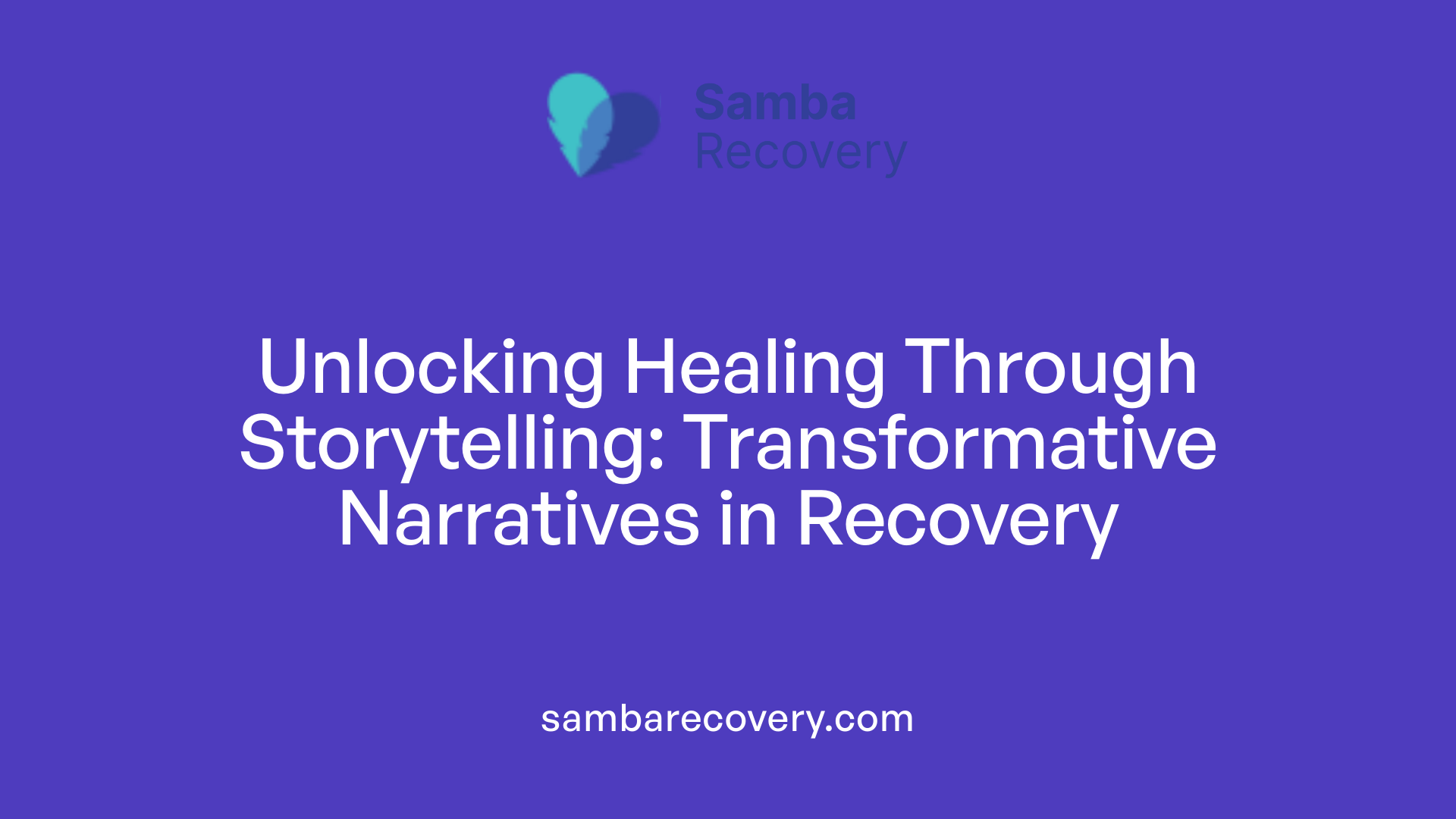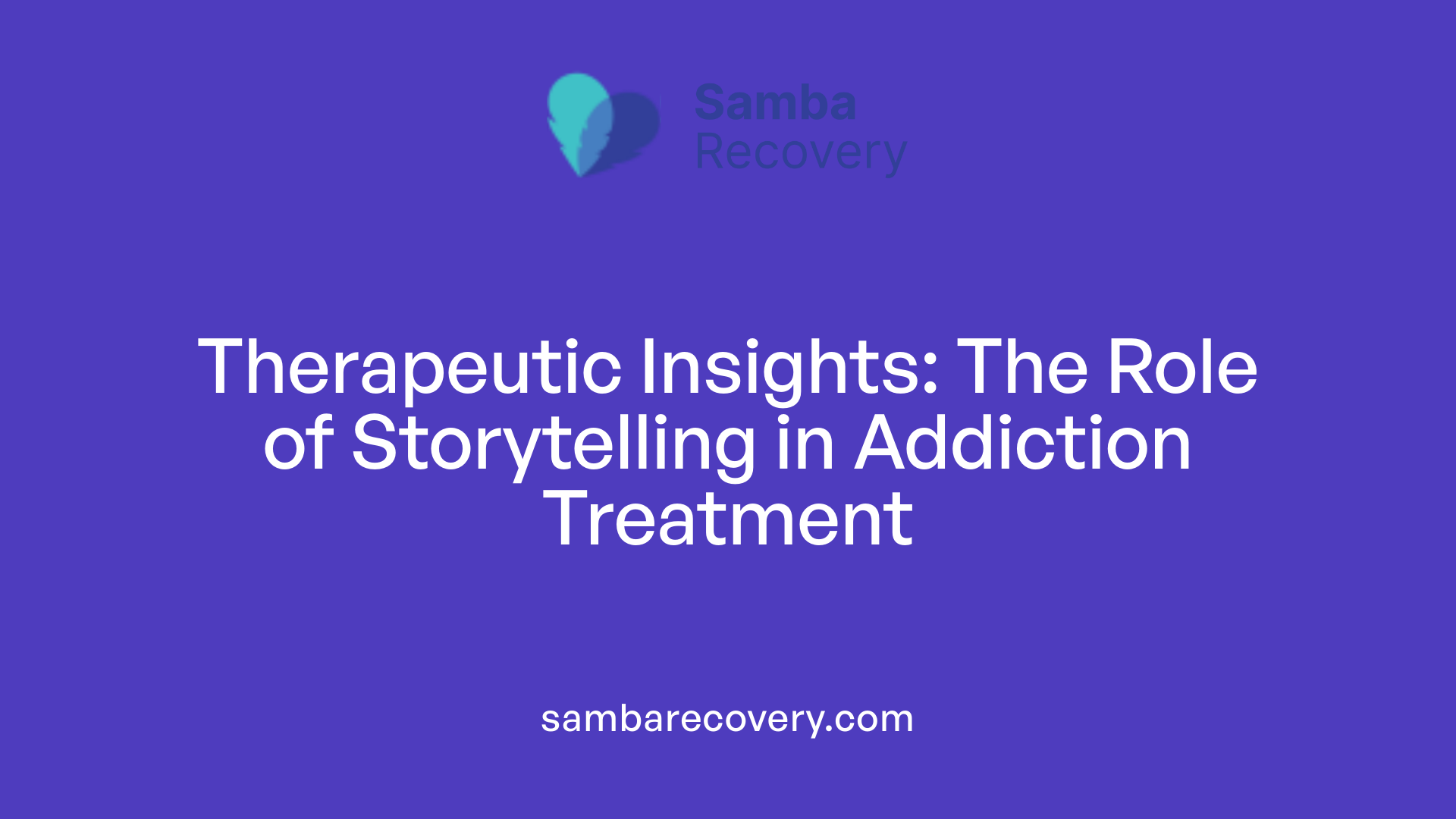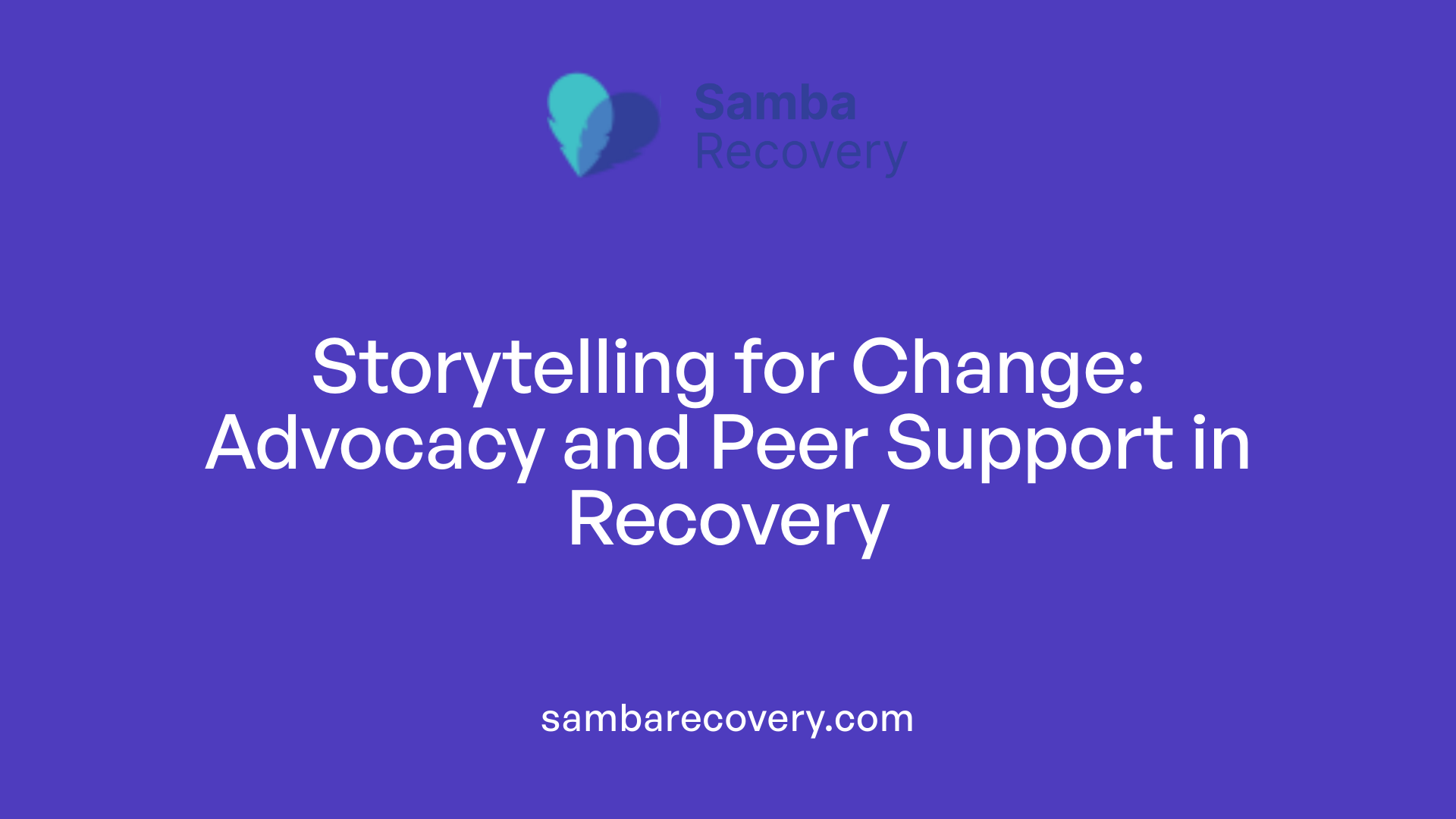Introduction
In the realm of addiction recovery, storytelling emerges not just as a therapeutic technique, but as a transformative force that facilitates healing, connection, and empowerment. Through the sharing of personal narratives, individuals on the recovery journey not only find their voice but also contribute to a broader understanding of addiction and its multifaceted challenges. This article explores the multifaceted role of storytelling in addiction treatment, highlighting its significance in fostering community, promoting personal growth, and challenging societal stigmas surrounding addiction.
Building Bridges of Empathy and Connection

What is the significance of storytelling in addiction recovery?
Storytelling in addiction recovery is significant as it fosters connection and community, reinforcing the essential sense of ‘We’ found in 12-step programs. By sharing personal narratives, individuals gain insights into their addiction trajectories, alleviating feelings of guilt and shame while promoting self-acceptance. This act of openly discussing experiences can be cathartic and inspirational, offering mutual support within a network of sober friends, which is vital for long-term sobriety.
Additionally, storytelling helps break down the stigma surrounding addiction. It facilitates open conversations about mental health, creating empathy within the recovery community. Individuals realize they are not alone in their struggles, thus reducing feelings of isolation.
The emotional connections forged through storytelling lead to a deeper empathy amongst peers, which is crucial for healing. Personal narratives inspire hope, reminding individuals that recovery is not only possible but also achievable, highlighting the strength of the human spirit.
The Role of Storytelling in Community Building
Community building in recovery settings is a fundamental aspect of the healing process. As individuals share their experiences, they contribute to a collective understanding of addiction. This shared knowledge promotes emotional support, nurtures resilience, and develops accountability.
Moreover, personal stories allow individuals to reveal their struggles candidly, providing a safe space for others to feel valued and heard. Through storytelling, participants learn from each other and grow together, transforming the narrative of addiction into one of recovery and redemption. Effectively, storytelling serves as both a therapeutic mechanism and a bridge that connects members of the recovery community.
The Healing Journey: Transformational Power of Sharing Stories

How does sharing personal narratives aid in the healing process during recovery?
Sharing personal narratives plays a pivotal role in the healing process during recovery from addiction. This practice helps individuals articulate and process challenging emotions and experiences that are often difficult to express. By openly sharing their stories, they engage in self-exploration, confronting personal struggles that may have hindered their recovery.
The act of storytelling fosters emotional release and personal growth. By externalizing their thoughts and feelings, individuals can reshape their narratives, allowing them to find hope and a healthier perspective on their journeys. This externalization creates a safe space for vulnerability, enhancing emotional connections among peers.
Moreover, storytelling helps reduce feelings of isolation, as individuals discover others who have faced similar challenges. This shared experience cultivates a sense of empathy and understanding, promoting a supportive community where encouragement thrives.
Furthermore, personal narratives challenge societal stigmas surrounding mental health and addiction. By normalizing conversations about these struggles, storytelling fosters openness that can inspire and motivate not just the storyteller but also those who listen. In summary, sharing personal stories is a transformative tool that not only aids individual healing but also strengthens community bonds in recovery.
Storytelling as a Cornerstone in Therapeutic Settings

What are the therapeutic benefits of storytelling in addiction treatment settings?
In addiction treatment, storytelling emerges as a vital therapeutic tool with several advantages. It encourages individuals to articulate their experiences, paving the way for emotional healing and self-discovery. As individuals share their recovery narratives, they build connections with others, reducing feelings of isolation and loneliness that are prevalent in addiction.
This communal aspect strengthens the sense of belonging and support among peers, fostering empathy and understanding. By openly discussing recovery journeys, individuals can challenge the stigma surrounding addiction and mental health, promoting a more accepting environment.
Additionally, storytelling allows participants to confront past struggles and recognize their growth. This self-reflective process enhances self-acceptance and resilience, motivating others by demonstrating that recovery is possible. For many, conveying their narratives becomes a source of empowerment, reinforcing commitment to their recovery goals.
Ultimately, storytelling not only offers therapeutic benefits but also cultivates a supportive community dynamic, crucial for sustained recovery. Stories inspire hope, encouraging individuals to seek help while celebrating their journeys and resilience.
Impact on empowerment and emotional healing
The impact of storytelling extends beyond personal narratives; it actively facilitates empowerment and emotional healing. By sharing stories in a non-judgmental space, individuals can explore feelings of shame and guilt often associated with addiction.
This shared vulnerability not only lightens personal burdens but also creates a platform for authentic connections. Participants find solace in knowing they are not alone in their struggles, which can significantly enhance their emotional well-being.
Empowering language in storytelling plays a pivotal role—using phrases that uplift and inspire can shape perspectives positively. This growth mindset encourages individuals to view their experiences not merely as struggles but as transformative journeys.
In summary, the therapeutic advantages of storytelling in addiction treatment are profound. It fosters personal growth, promotes emotional healing, and strengthens community ties, making it an essential element of recovery.
Advocacy and Support: Storytelling in Action

How is storytelling used in recovery advocacy and peer support?
Storytelling serves as a critical tool in recovery advocacy and peer support, playing a vital role in fostering connection, empathy, and understanding among individuals experiencing addiction. By sharing their personal stories, individuals in recovery can break down stigma surrounding substance use, conveying the complexities of addiction to a broader audience.
Through effective storytelling, individuals empower themselves and others, as authentic narratives highlight significant turning points that resonate emotionally with listeners. This authenticity helps listeners to see the truth in the struggles and triumphs of their peers, strengthening a sense of community.
Scientific studies demonstrate that storytelling fosters shared emotional experiences, involving similar neural processes between the storyteller and the audience. This shared connection can lead to deeper understanding and support among peers, making it an essential aspect of recovery groups.
Moreover, personal narratives in recovery can help educate the public about addiction and its multifaceted nature. By highlighting both the challenges and rewards of recovery, storytelling works to dispel myths, reduce discrimination, and promote a more compassionate view of those affected by addiction.
In summary, storytelling not only supports individual healing journeys but also promotes greater societal change, encouraging others to seek help and fostering a culture of solidarity and understanding within recovery communities.
Towards Prevention: Storytelling in Youth Education

Can storytelling be utilized as a tool for addiction prevention and awareness?
Yes, storytelling can be a powerful tool for addiction prevention and awareness. Research indicates that storytelling-based education effectively reduces the readiness towards addiction among adolescents, helping them understand the dangers of drug misuse. Through engaging narratives, young people are introduced to personal experiences that highlight the consequences of substance abuse.
The power of personal narratives
Sharing personal stories allows individuals to connect emotionally with their peers, fostering resilience and encouraging positive identity development. This connection is crucial in educational settings, as it enhances community engagement and develops protective factors against addiction.
Reducing stigma and promoting empathy
Storytelling also serves to reduce stigma associated with substance use disorders. By presenting relatable narratives, it cultivates an empathetic understanding among audiences, leading to a greater willingness within communities to engage in preventive measures.
Educational initiatives targeting adolescents
Incorporating storytelling into educational initiatives can empower young people to face challenging social issues, including substance abuse. Programs designed around personal narratives create a supportive environment where discussions can effectively challenge stereotypes and promote honest conversations about addiction and recovery.
Harnessing Psychological Benefits through Stories
What are the psychological benefits of storytelling in the recovery process?
The psychological benefits of storytelling in recovery are both profound and diverse. One significant impact is the promotion of self-expression, which is crucial for individuals who have suffered from addiction. When people share their personal narratives, they articulate their experiences in a safe and supportive environment, fostering emotional healing.
Additionally, storytelling plays a vital role in reducing stigma. Sharing one’s story challenges the stereotypes often associated with addiction, encouraging a more empathetic understanding of the struggles faced by individuals. This practice not only enhances self-esteem but also reinforces a sense of community, as people realize their experiences are shared by others.
Storytelling also aids individuals in processing trauma associated with their addictive behaviors. It can alleviate symptoms of depression and anxiety, while simultaneously promoting identity reconstruction. As stories unfold, they inspire hope and encourage individuals to seek help, fostering connections that are essential for sustained recovery.
In summary, storytelling in recovery is a powerful therapeutic tool that cultivates personal growth and influences community perceptions surrounding mental health, illustrating the journey from addiction to recovery.
Conclusion
As we delve into the role of storytelling in addiction recovery, it becomes increasingly clear that this age-old practice is a beacon of hope and transformation. The sharing of personal narratives reinforces essential connections, provides therapeutic relief, and serves as a robust tool for advocacy and prevention. By embracing storytelling, individuals can forge paths toward healing and long-term sobriety, while collectively challenging societal stigmas about addiction. It is through these stories that recovery communities can strengthen their bonds, foster mutual support, and inspire lasting change. Storytelling not only heals the storyteller but also educates and empowers audiences, driving forward a powerful movement towards a more empathetic and understanding world.
References
- Why Storytelling Matters in Addiction Recovery
- The Influence of Story Sharing in Addiction Recovery
- [Box], THINKING ABOUT STORYTELLING – Incorporating Peer …
- Recovery Storytelling – A Powerful Tool For Advocacy – CCAR
- Effects of Storytelling-Based Education in the Prevention of Drug …
- Sharing Addiction Recovery Stories – Freedom Detox
- The Healing Art of Storytelling: A Powerful Therapeutic Tool
- Art of Storytelling: Craft Personal Narrative on Path to Sobriety
- Purpose in Pain: The Power of Storytelling in Recovery






